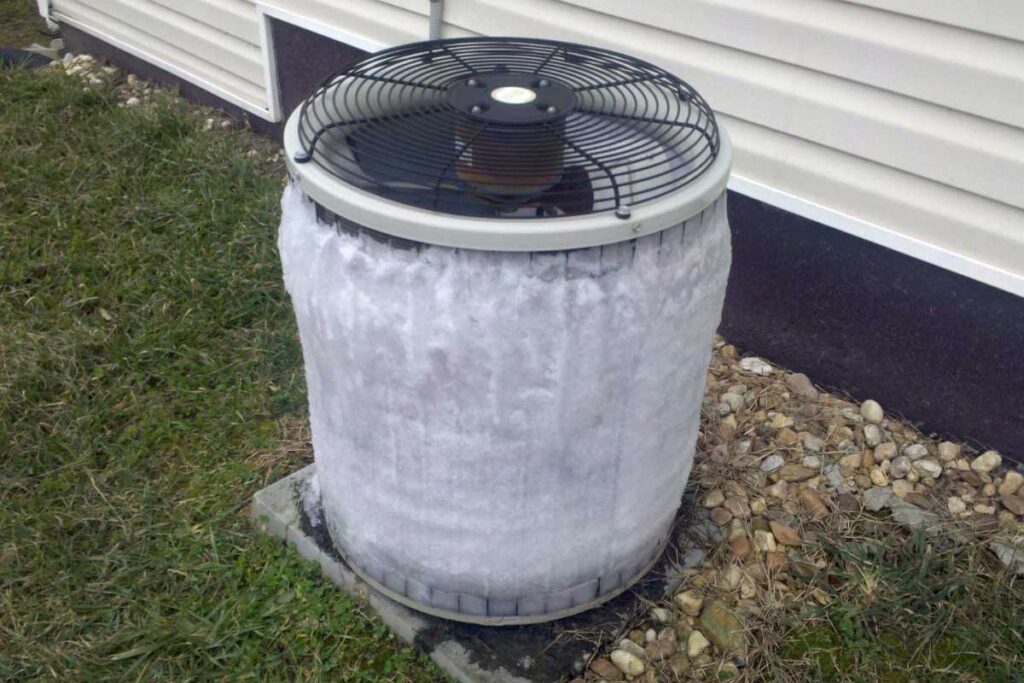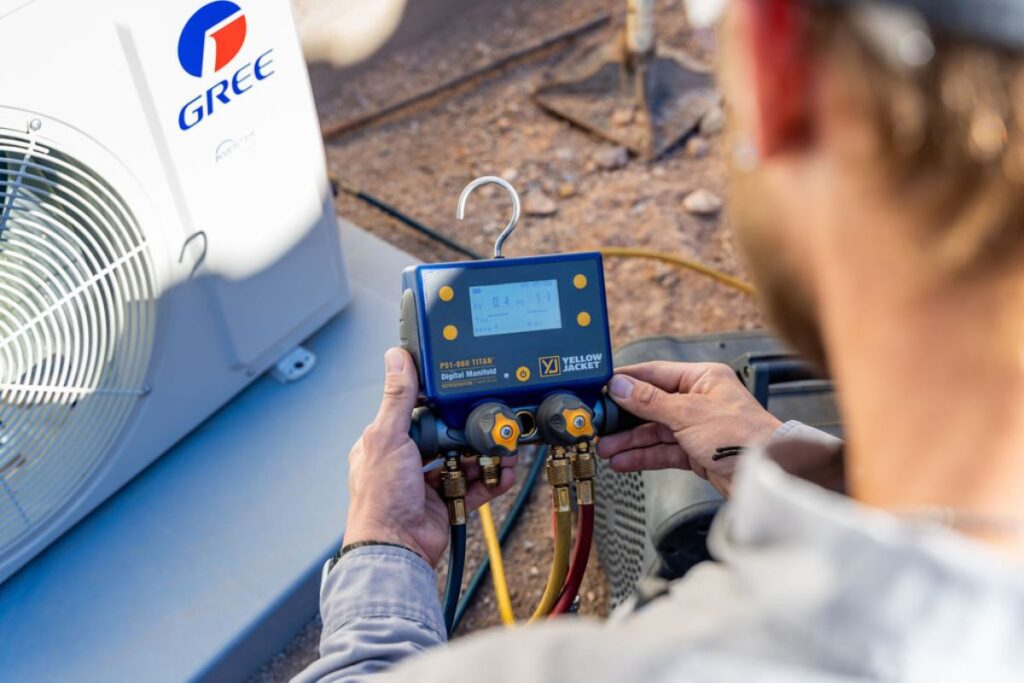
What Causes AC Coils to Freeze and How to Prevent It
Understanding what causes AC coils to freeze is crucial for both effective prevention and efficient problem-solving. When coils freeze, your air conditioning system can’t operate properly, leading to discomfort and potential damage to the unit.
The good news is there are simple steps you can take to prevent frozen coils.
Let’s dive into what causes AC coils to freeze and how you can prevent this common air conditioning issue.
Table of Contents
Common Causes of Frozen AC Coils
While there are many issues that can lead to frozen AC coils, some of the most common are:
Insufficient Airflow
Proper airflow is crucial for your AC unit to function correctly. Professional HVAC technicians often identify insufficient airflow as a primary contributor to frozen coils. When the air can’t move freely through the system due to dirty air filters or obstructed air ducts, heat exchange is hampered, causing the coils to become too cold and eventually freeze. Regular maintenance, including replacing or maintaining your air conditioner, is essential to avoid this issue.
Low Refrigerant Levels
Another common cause is low refrigerant levels. Refrigerant is the lifeblood of an AC system, and when levels drop, the pressure within the coils decreases, leading to lower temperatures and ultimately ice formation in and around evaporator coils. It’s important to address refrigerant leaks promptly, not just to prevent freezing, but to ensure efficient operation and prevent potential environmental harm. If you need help, you can schedule a home AC repair service with a professional.
Outdoor Temperature
Did you know that most air conditioning systems are not designed to operate in temperatures below around 60°F (16°C)? Running the air conditioner when it’s too cool outside can lead to coils freezing. Homeowners should be aware of the suitable operating temperatures for their systems; most systems are not designed to run when the outside temperature is too low. Consider variable speed AC for Tucson homes to handle varying temperatures more efficiently.
Mechanical Failures
Components within the AC system can fail, leading to frozen coils. Skilled HVAC technicians can identify issues such as a malfunctioning blower fan or a stuck contactor, which can impede the function of the unit and cause the coils to freeze. Regular professional inspections can help detect and correct these mechanical failures before they lead to bigger problems. For the best results, consider reliable air conditioning installation to ensure your system is set up correctly from the start.
Drainage Problems
When AC units can’t drain condensation effectively, water can accumulate and freeze on the coils. Experienced professionals will ensure that drainage systems are clean and clear of obstructions during routine maintenance visits, helping to prevent water from backing up and contributing to frozen coils. Additionally, for homes with unique needs, a professional mini split installation can be a viable solution.
In all cases, addressing a frozen coil situation quickly and effectively is necessary to maintain the health and longevity of the air conditioning system. It’s always recommended to consult with a professional HVAC technician if you suspect your AC coils are freezing or if you need regular preventative maintenance performed.
How To Stop AC Coils From Freezing

Keeping your AC coils from freezing is key to maintaining an efficient and long-lasting air conditioning system. The following strategies can help you prevent your AC coils from freezing and avoid unnecessary breakdowns:
- Perform regular maintenance checks: Having a professional HVAC technician inspect and service your AC system at least once a year to ensure that all parts are functioning correctly and to nip potential issues in the bud.
- Ensure proper airflow: Check and replace your air filters every 1-3 months or as recommended by the manufacturer. Keep registers and vents clear of furniture, curtains, and other obstructions to allow air to circulate freely.
- Maintain adequate insulation: Proper insulation can help keep the cooling coils from freezing due to extreme temperature differentials. Insulate your home properly to maintain consistent temperatures and reduce the stress on your AC system.
- Check refrigerant levels: It’s important to have a professional check the refrigerant level and verify there are no leaks in the system. If needed, they can recharge the refrigerant to the appropriate levels; low levels can cause your coils to freeze.
- Inspect drainage system: Blocked drainage lines can cause water to back up and freeze on the coils. Make sure your condensate drain is clear of any debris and that it drains properly to prevent water-related freezing issues.
- Avoid setting the thermostat too low: While it might be tempting to lower the thermostat during particularly hot days, setting it too low can lead to frozen coils. Keep the temperature setting within a recommended range to avoid overcooling and straining the system.
FAQs About Frozen AC Coils
What causes AC coils to freeze?
Several factors can contribute to frozen AC coils, including insufficient airflow due to dirty filters or obstructed ducts, low refrigerant levels, operating the unit in temperatures below its design range, mechanical failures within the system, and drainage issues causing water accumulation. Addressing these issues promptly through regular maintenance and professional inspections can help prevent frozen coils.
How can I prevent my AC coils from freezing?
Preventing frozen AC coils involves several proactive measures, including performing regular maintenance checks by a professional HVAC technician, ensuring proper airflow by replacing air filters regularly and keeping vents unobstructed, maintaining adequate insulation in your home to reduce temperature differentials, checking refrigerant levels and addressing leaks, inspecting drainage systems to prevent water accumulation, and avoiding setting the thermostat too low to prevent overcooling.
Why is it important to address frozen coil issues quickly?
Addressing frozen coil issues promptly is essential to maintain the health and longevity of your air conditioning system. Frozen coils not only impair the unit’s ability to cool effectively but can also lead to mechanical failures and costly repairs if left unresolved. Consulting with a professional HVAC technician at the first sign of frozen coils ensures proper diagnosis and timely resolution of the issue.
How can Done Rite help prevent frozen AC coils?
Done Rite offers comprehensive AC maintenance services, including regular inspections and preventative maintenance checks to ensure your system operates efficiently and reliably. By scheduling maintenance with Done Rite, you can significantly reduce the risk of frozen AC coils and ensure your unit operates smoothly throughout the warmer months. Contact Done Rite today to schedule maintenance or speak to an expert technician about your AC concerns.
Prevent Frozen AC Coils with Done Rite
With these tips and keeping up on regular maintenance, you can significantly reduce the risk of your AC coils freezing and ensure that your air conditioning unit operates throughout the warmer months without your AC unit giving you any unexpected problems. For more information on how to prevent issues and optimize your AC, check out our blog on optimal air conditioner placement.
To schedule any AC maintenance or to have an expert inspect your unit, get support here or call us at 520-369-3966. We also offer HVAC services in Oro Valley.
